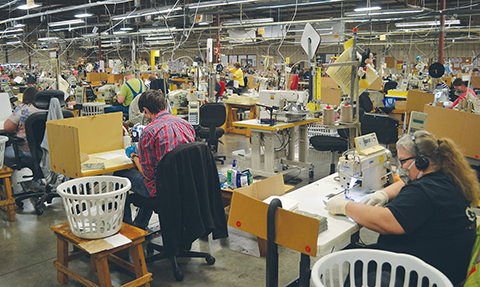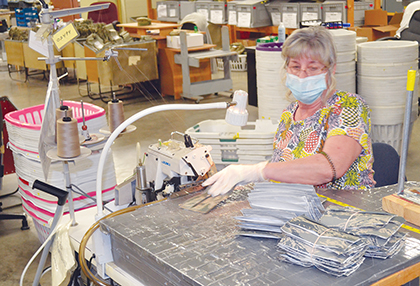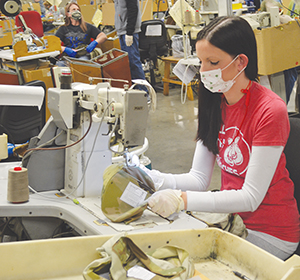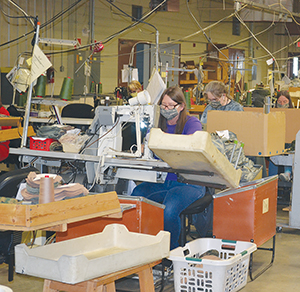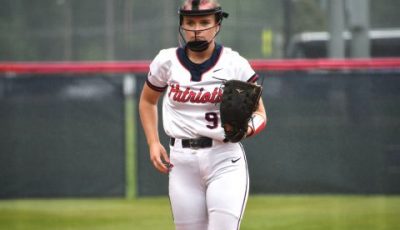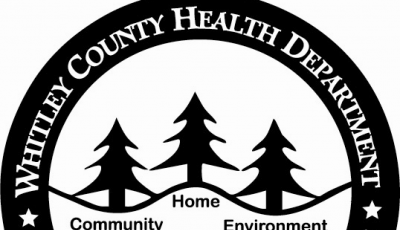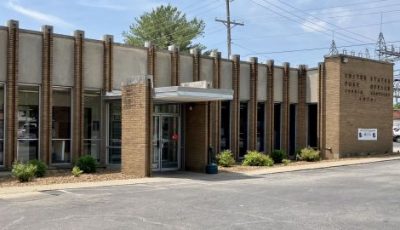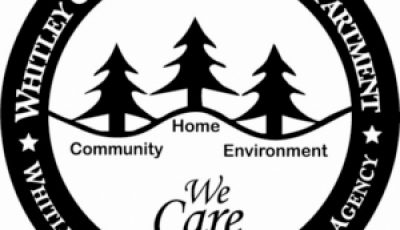SEKRI begins production on 275,000 life-saving masks
 Everyone is trying to find ways to contribute to the escalating coronavirus problem in our country right now. For many, that may be simply making a decision to stay home instead of visiting friends and family in order to keep from potentially spreading the disease. For others, it may be working long, difficult shifts in a medical facility in order to care for the sick.
Everyone is trying to find ways to contribute to the escalating coronavirus problem in our country right now. For many, that may be simply making a decision to stay home instead of visiting friends and family in order to keep from potentially spreading the disease. For others, it may be working long, difficult shifts in a medical facility in order to care for the sick.
For Southeastern Kentucky Rehabilitation Industries, Inc. (SEKRI) of Corbin, the opportunity to assist with the manufacturing of personal protective equipment (PPE) has presented workers with their chance to play an important role in combatting COVID-19. It is an opportunity that Executive Director Norm Bradley says his team is willing and eager to accept.
“They were saying, ‘let’s go’ and ‘we’re ready to go,’” Bradley said of his workforce when he informed them recently that they would be tasked with stitching together a grand total of 275,000 protective masks for the state’s Departments of Emergency Management and Homeland Security.
Before we get into the specifics of SEKRI’s latest contract, however, let’s back up and discuss briefly just who they are as an organization.
“The company started in 1971,” Bradley explained. “Since then it has grown into eight locations, with about 800 employees. We primarily make sewn products for the Department of Defense. We make a variety of products for all branches of service, including hats, fire retardant garments, and all of the first aid kits issued to Army soldiers.”
“Our primary focus,” Bradley continued. “Is providing jobs for people with disabilities. Over 75 percent of our direct labor workforce are individuals with some kind of a documented disability.”
Getting back to the protective masks, Bradley said the whole venture began with the idea of making just enough to ensure the safety of SEKRI workers. “When this got started we started focusing on social distancing, and we wanted to get masks for everyone,” he said. “We had some trouble finding those, though, so we decided to just make our own.”
Not long after, SEKRI Deputy Executive Director and Chief Financial Officer Leo Miller was contacted by the state. “About a week into the lockdowns we were contacted via e-mail to see if we could manufacture some masks,” he said. “We had some Airforce material that we were not currently using, so all we’ll be building into the contract is the cost of labor.”
“We took them some samples of the masks we had made, they decided which one, and now we will be producing 275,000 within the next 7-8 weeks.”
SEKRI’s headquarters and distribution center in Corbin, their stitching plant off of the Corbin Bypass and other plants in Cumberland, Harlan, Middlesboro and Paris are now hard at work putting together this life-saving PPE that there is such a dire need for pretty much everywhere in the country right now. Speaking about being able to provide this service, Bradley said, “Being a company of this nature, being proud of what we do and being civic minded, when we have an opportunity to step up and make these masks during this unprecedented time that we’re all going through, it just seemed like a natural step for us.”
For now, workers at SEKRI have their hands full with fulfilling this order for 275,000 protective masks, but Bradley said the company could also be tasked with stitching together gowns as well in the near future. The details of that arrangement are still being discussed, though, and nothing has been confirmed as of now.
Sewing technicians at SEKRI were not used to producing this particular type of product before, but Bradley is proud to report that they have caught on quickly, and masks are currently being assembled at a rapid pace. “This is something that we hadn’t done before,” he said. “But we are proving that we can. The main thing is for us all to get through this time together right now, and then if there is a continuing need for these in the long term, we can certainly look at it at that time.”
“It may develop into something long term, but even if it doesn’t, we’ve done our part to help.”
Another important piece in this puzzle is Corbin Bypass plant manager Delena Mills, who started her career at SEKRI at a sewing machine back in 1996. She discussed the sudden changes that had to take place in order to accommodate the production of these new products at her facility, saying, “It’s just been amazing. This is not a workplace. It is a family.”
Mills mentioned one of her workers at the Corbin plant, Scott LaQuire, as someone who has really taken to the new task of helping manufacture these masks with a high level of enthusiasm. “He was working on stitching together caps,” she said. “But when he heard that the masks were coming in he said that he wanted to move over and begin working on those. His wife is a nurse, so he wanted to do something that would be helping those in her field. You can just see the pride in his face with what he is doing right now.”
Mills also mentioned supervisor Betty Adams as just one of many other workers who are happy to do whatever is asked of them in order to ensure that quotas are being met, and shipments are going out on time.
“I don’t take any of the credit,” Mills said of her team. “Because if it were not for all those people in the plant, we couldn’t do anything. I hope that we can continue to make these masks even after this is over, but if not, at least we will be able to look back on the experience and say that we did our part to help.”


